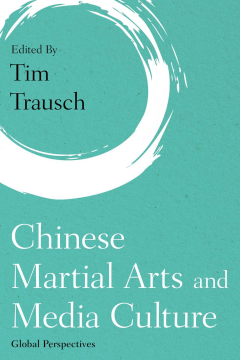
Additional Information
Book Details
Abstract
Signs and images of Chinese martial arts increasingly circulate through global media cultures. As tropes of martial arts are not restricted to what is considered one medium, one region, or one (sub)genre, the essays in this collection are looking across and beyond these alleged borders. From 1920s wuxia cinema to the computer game cultures of the information age, they trace the continuities and transformations of martial arts and media culture across time, space, and multiple media platforms.
Scholars have traditionally separated the study of the ‘Asian martial arts’ as bodily practice from the examination of the ideas and images that uphold them. This collection expertly problematizes that notion while showcasing innovative insights from media and cultural studies. Fresh and always fascinating, it will be critical reading for anyone curious about the place of the martial arts in the modern world.
Benjamin N. Judkins, Visiting Scholar, Cornell University East Asia Program and co-author of The Creation of Wing Chun: A Social History of the Southern Chinese Martial Arts
Tim Trausch is a research associate in the Department of East Asian Studies at the University of Cologne. His research focuses on Chinese media culture and aesthetics. He has published essays on Chinese-language film and television, and a book on the aesthetics of martial arts cinema. His current work focuses on photography and modernity in late imperial and Republican-era China.
Whether examining the ‘traces’ of Bruce Lee, the ‘effortless’ action of Hong Kong martial arts cinema or online wuxia worldbuilding, this book is an essential read for anyone interested in the re-shaping of Chinese martial arts in the mediascapes of the 20th and 21st centuries. Covering film, TV, theatre, literature and gaming, it’s a veritable 36th Chamber of interdisciplinary perspectives.
Leon Hunt, Senior Lecturer in Film and TV Studies, Brunel University
This lively, varied and innovative collection breaks the confines of film and area studies to chart representations of the martial arts as they circulate in our global media culture. Doing so, it offers valuable new insights into both the transnational media landscape and the meaning of the martial arts within this, not only today but also historically.
Luke White, Senior Lecturer in Visual Culture and Fine Art, Middlesex University, UK
Beginning with the first movies produced in Shanghai during the 1920s, this book mainly addresses the amazing success and manifold metamorphoses martial arts narratives have undergone since global capitalism entered and transmogrified Asian modernities. The virtual universe of today’s digital martial arts games is furthermore traced all the way back into antiquity, when the fictional wuxia communities’ enchanted heterotopia of the “Rivers and Lakes” (jianghu) first emerged. Besides exploring a range of methodologies for the cultural analysis of the most widely known contemporary representations, readers are also introduced to less popular topics and forms that critically interrogate the contemporary globalized hype. For instance, it is demonstrated how the Orientalist fashioning of the martial arts hero serves ambiguous trajectories in global cultural contexts, as it can be employed to either overcome or redraw ethnic and cultural boundaries. In sum, the book offers timely, sound, multi-scalar scholarship that sheds new light on the major generic, aesthetic, and ideological configurations of martial arts since the early 20th century. Its intellectual rigor and rich material corpus moreover facilitate significant conceptual advances in this and related fields of inquiry.
Andrea Riemenschnitter, Professor of Modern Chinese Language and Literature, University of Zurich
Table of Contents
| Section Title | Page | Action | Price |
|---|---|---|---|
| Chinese Martial Arts and Media Culture | Cover | ||
| Contents | v | ||
| List of Figures | vii | ||
| Acknowledgments | ix | ||
| Introduction: Martial Arts and Media Culture in the Information Era: Glocalization, Heterotopia, Hyperculture | xi | ||
| 1 The Demise of the Wuxia Film? The Mutation of a Genre from Manifestation of Crisis to Postmodern Pastiche and Reaffirmation of Centralized Power | 1 | ||
| 2 Transposing Jianghu in Chinese Martial Arts Cinema from the Twentieth to the Twenty-First Centuries | 21 | ||
| 3 A Touch of Sin, Translation, and Transmedial Imagination | 51 | ||
| 4 The Effortless Lightness of Action: Hong Kong Martial Arts Films in the Age of Immediacy | 63 | ||
| 5 Imagining Transcultural Mediascapes: Martial Arts, African Appropriation, and the Deterritorializing Flows of Globalization | 81 | ||
| 6 From the Boxers to Kung Fu Panda: The Chinese Martial Arts in Global Entertainment | 101 | ||
| 7 Bruce Lee, Bruceploitation, and Beyond: Renegotiating Discourses of Original and Copy | 119 | ||
| 8 David Henry Hwang’s Kung Fu in Cross-Cultural Perspectives | 147 | ||
| 9 In Search of the 36th Virtual Chamber: Martial Arts in Video Games from Screen Fighting to Wuxia Worldbuilding | 161 | ||
| 10 The Multiuser Dungeon Era: The Origins of Chinese Martial Arts Online Games | 175 | ||
| Afterword: Martial Arts and Media Supplements | 189 | ||
| Index | 203 | ||
| About the Contributors | 209 |
